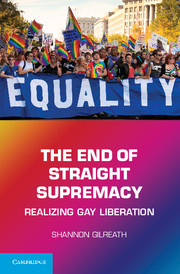3 - Law/Power
The Appropriation of Gay Identity in Lawrence v. Texas – and the Substantive Alternative
from Part I - Equality and Making Meaning
Published online by Cambridge University Press: 05 June 2012
Summary
I think [judges] have failed adequately to recognize their duty of weighing considerations of social advantage. The duty is inevitable, and the result of the often proclaimed judicial aversion to deal with such considerations is simply to leave the very ground and foundation of judgments inarticulate, and often unconscious.
Oliver Wendell Holmes, “The Path of the Law”In the summer of 2003, the U.S. Supreme Court decided Lawrence v. Texas, invalidating the states’ remaining sodomy laws. Justice Kennedy’s majority opinion proceeded through a due process analysis to invalidate a Texas law, unequal on its face, that criminalized same-sex sex. Many Gay rights advocates greeted the decision with enthusiastic abandon. But exactly what was decided in Lawrence? Exactly what did we get? As I see it, the Court made a glancing pass at equality jurisprudence, but its mere passing reference is highlighted by the fact that certiorari was granted on the question of whether the Texas law violated equal protection; and equality arguments were made by lawyers for Lawrence and Garner and by advocates for the amici curiae. As has been typical in equality adjudication, the questions most in need of answers were the very questions avoided by the Court. This chapter asks those questions and posits answers – specifically, a rethinking of the equality norm with the reality of the Gay experience as its method. Importantly, it exposes that Lawrence’s equivalence is not the same as equality. Equivalence is about approximation – assimilation on the oppressor’s terms. Equality is about freedom – about who gets to make the rules.
I explain how the privacy rationale employed in Lawrence, its equality promotion notwithstanding, actually delivered equivalence under the law – not real (substantive) equality – thus serving to further entrench heterodominance. An applied equality rationale of the kind I advocate here would have avoided this result and would have created access to foreclosed public spaces that currently operate as institutionalized, heterodominated hierarchy in contravention of equality. Curiously, a substantive equality analysis also would have avoided Justice Scalia’s feared disruption of other forms of traditional morals legislation (e.g., bigamy, prostitution), which Scalia believes are left vulnerable by the Lawrence majority’s substantive liberty approach.
- Type
- Chapter
- Information
- The End of Straight SupremacyRealizing Gay Liberation, pp. 71 - 108Publisher: Cambridge University PressPrint publication year: 2011



